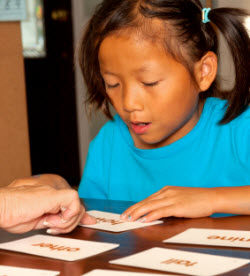 Whether your child needs support this school year to improve his or her grades, master a new subject or prepare to take the SAT, finding the right tutoring resource, at a fee you can afford, can be a challenge. Here are tips from experts on what’s available in services, how to shop different options and some free tutoring resources.
Whether your child needs support this school year to improve his or her grades, master a new subject or prepare to take the SAT, finding the right tutoring resource, at a fee you can afford, can be a challenge. Here are tips from experts on what’s available in services, how to shop different options and some free tutoring resources.
Tutoring options and how to find one
How do you know your child needs a tutor? Merrilyn Larson, a counselor at Meeker Middle School in Tacoma, says that beyond being informed by a teacher or counselor your child could benefit from tutoring support, “grades and attitude toward help are indicators that tutoring may be an option.”
Once you’ve decided to seek tutoring services, you might start by visiting your school website to see if your school has a tutoring coordinator, recommends Susan Huntley, Tutoring Coordinator for Seattle Public School’s Washington Middle School.
Another option is programs at public libraries, she notes. “Eleven Seattle Public Library branches have after-school tutoring programs, as do the Boys and Girls Club, The YMCA, El Centro de la Raza, and other community partners offer after school tutoring at some schools, including ours.” (See below for public library information.)
If you decide to find a private tutor, Larson says that most of her parents shop online for tutors or find them through word of mouth. Resources can range from specific skill support for math or reading, such as the Kumon program, to tutoring centers such as the Sylvan and Huntington Learning Centers individual private tutors. An extensive list of tutoring resources is available on the ParentMap website.
A number of specialized programs also exist, such as Treehouse (for students in the foster care system), Helping Link (for Vietnamese students and families) and Refugee Womens Alliance (ReWA).
The one-on-one tutor search
If you decide that your child would benefit most from working with an individual tutor, Huntley says there are several things to keep in mind. “Most parents would prefer that a tutor have a college education and local references,” she says. She recommends doing a background check and that the student and tutor only meet in public places where other responsible adults are present.
Cornell Atwater, the center director and franchisee owner of LearningRx of Issaquah, says that parents shopping for tutoring support should ask for references up front and conduct an interview with the potential tutor before agreeing to services.
“Be prepared with questions to ask at the interview as if you were hiring a person for a job. Have your child give you feedback on his or her first impressions of this tutor as getting ‘buy-in’ has a direct impact upon how successful the tutoring sessions will be,” she says.
She also recommends asking for examples as to how the tutor would keep your child motivated “especially if the subject matter is something he or she [your child] dislikes.”
And be sure to ask your would-be tutor about the methods and content they plan to use. Huntley notes that they should be very specific about materials and resources.
Tutoring fees
What should you expect to pay for a one-on-one tutor? Fees range widely, anywhere from $10-$25 an hour on up to $60 or more, depending on a tutor’s experience and other factors. Individual tutors negotiate their hourly fee while tutoring centers often have a weekly or monthly fee, plus a registration fee.
Certified teachers, not surprisingly, tend to charge more per hour for tutoring than college or high school students and non-certified instructors. Some tutors may charge less per student for two or more students in a session.
How to check for progress
Merrilyn Larson says ideally after engaging the services of a tutor a parent should see concrete outcomes such as “improved grades, improved student attitude toward tutored subjects and an improved attitude towards learning over the school year.”
Susan Huntley says that the tutor should be in regular communication with the parent about specific observations about a student’s progress (general comments like “he’s doing great” don’t cut it). When possible, she says, teachers should be able to communicate with the tutor as well “so the work remains aligned with school expectations.”
Affordable tutoring options
If a one-on-one tutor for your child seems beyond reach, there are alternatives and ways to cut costs. Here are a few:
Hire a student. Mary Beth Gunson, M.Ed, Ed.S, a Counselor at Bellevue’s Interlake High School, says that while hiring a certified teacher as a tutor is ideal, it’s also the most expensive option. “Sometimes older high school students or college students make great tutors and their rates are much lower.”
Check your school. Gunson says that in addition to enlisting the help of a paid tutor, students can often find free help at their school. In her district, free tutoring support is even available on site at the district’s middle and high schools.
Go online. Online education resources are increasing rapidly; many are free and can help serve as tutoring support. The Khan Academy, for example, offers short mini-lessons on almost all academic subjects. Gunson notes that the Khan Academy “is especially helpful for math support.”
Log on to the library: Many library systems around Puget Sound also offer free online tutoring support; all you need is a library card.
The Seattle Public Library system offers online homework from tutors in math, science, English and social studies seven days a week from 1 p.m. to 10 p.m, in Spanish and English. You can also "ask a librarian" questions via chat 24 hours a day. In addition, says Youth Services Manager Julie Ann Oiye, “We provide in-person Homework Help at 11 branch locations around the city of Seattle.”
Similarly, Tacoma Public Library also offers online homework for kids grades 3-12 from tutors seven days a week from 1 p.m. to 10 p.m, in Spanish and English. Kids can access both homework help and "skills building" help. You can also "ask a librarian" via chat,
At Kitsap Regional Library, students get homework help Monday through Saturday from a live tutor online through a program called Brainfuse (SPL also uses this system). Like most libraries, it also offers premium databases such as Proquest “where students can find information from thousands of sources to help with research papers and projects,” says Sharon Grant, Digital Branch Manager of Kitsap Regional Library.
The Pierce County Library System also offers online homework help. Students may access the online service on their computers or mobile devices at piercecountylibrary.org (search the site for “homework” every day from 1 pm to 10 p.m.)
The King County Library System provides “materials, in-person and online tutors, and online resources to support all students in all subjects and for test preparation,” says Terry Claypool, the Manager of Staffing Support Services.
A specific program offered at many KCLS branches is Study Zone, a drop-in program which provides both in-person and online tutors. The in-person program is done in a group format, with one to five students working with each tutor.
Kathleen F. Miller is a Sammamish-based writer, artist and mother of two. Her daughter has used the Khan Academy website as a resource for math homework and her son is enrolled in the Redmond Ridge Kumon program.
See also:









